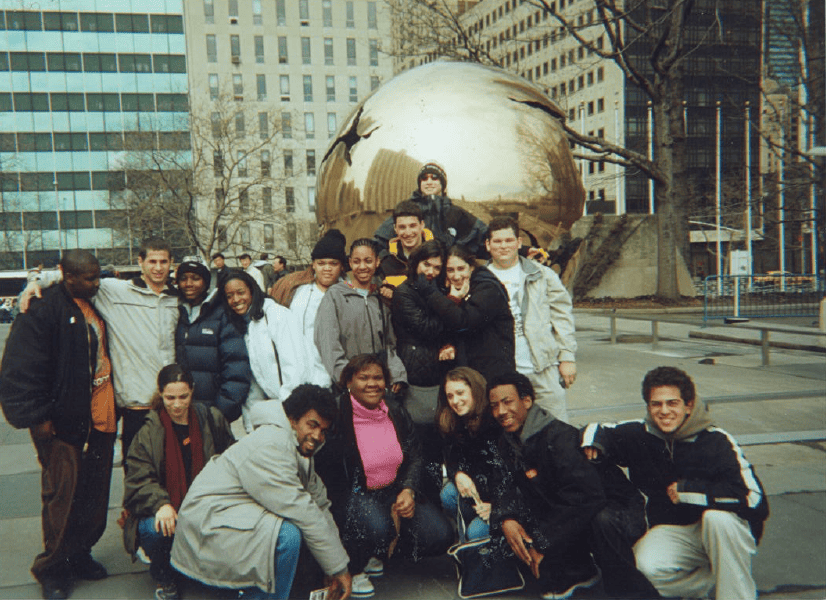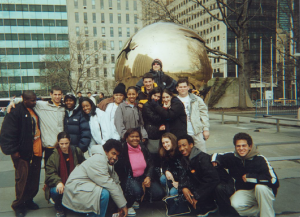Transformational experience for African American and Jewish teenagers to be coordinated by five community organizations
A year long leadership development program for 40 African American and Jewish high school students in Tidewater, Operation Understanding Hampton Roads (OUHR), will re-launch this year, according to the Virginia Center for Inclusive Communities.
Over the course of the OUHR year, high school student participants will build understanding, respect, and friendship through monthly workshops and a fourday summer Civil Rights trip to sites in the Farmville and Richmond areas. OUHR participants will develop their personal strengths, share one another’s cultures and religions, and enhance their leadership abilities. Sophomores and juniors may submit applications to participate in this prestigious program. Applications will be accepted through February 1.
“Operation Understanding Hampton Roads will play a critical role in preparing students to be inclusive leaders in their schools and community,” says Jonathan Zur, president & CEO of the Virginia Center for Inclusive Communities. “At a time when hurtful rhetoric, bullying, and prejudice create divisions and barriers in our society, OUHR invests in students who will develop life-long skills in communication and leadership across lines of difference.”
OUHR was active from 1998 through 2006. In 2016, it is being led by the Virginia Center for Inclusive Communities, along with coalition partners the Community Relations Council of the United Jewish Federation of Tidewater, Tidewater Jewish Foundation, Urban League of Hampton Roads, and the YWCA of South Hampton Roads.
For more information about Operation Understanding Hampton Roads or to obtain an application form, visit www.inclusiveva.org/ouhr or email Robin Mancoll, director, CRC at rmancoll@ujft.org.
A few reflections from the past:
Perhaps the most meaningful and memorable events of the nine year history of Operation Understanding Hampton Roads (OUHR) for us were the times we crossed the Edmond Pettus Bridge in Selma, Alabama. Crossing that bridge, which was the site of a massacre of activists on Bloody Sunday in 1964, while walking arm in arm and singing “We Shall Overcome,” with nine classes of teenagers was both emotional and energizing.
Just recently, while attending a “Dialogue on Race in Norfolk,” we touched base with Ariel Stein, who is a graduate of OUHR. He told us that crossing “The Bridge” was the signature event in his life. That experience was more than 10 years ago, yet, he described it and his feelings accurately and in detail. He said that his year in OUHR provided him with the incentive to “give back to the community” and to speak out against racial injustice. He has stayed in contact with almost all the members of his class, Jewish and African- American. Ariel says that all his classmates have the same attitudes as he, and they have done many things in their lives to combat racial prejudice.
The hope of the founders of OUHR in 1998 was to create a cadre of “Ambassadors for Diversity;” a core of young leaders, who could call on each other when necessary, to work together to make this a more equal society. How exciting it is for us to see our dream come true. And how exciting it is to know that the community is committed to re-establishing OUHR.
As we say in Shul, “May you go from Strength to Strength.”
—Lois and Barry Einhorn, OUHR founders and facilitators
Upon graduating Old Dominion University, I had a desire to become more involved with my local community. I found a posting on Old Dominion’s website about a local opportunity with the JCC to be a facilitator/mentor for Operation Understanding Hampton Roads. From the start, I have never been a part of a more rewarding and fulfilling program in my entire life. I was looking for community service hours, instead, I received an impression that would follow me all of my life. From the compassion and drive of the Einhorns to bridge the diversity gap between the African American and Jewish communities to the unforgettable trips, and the once in a life time guests that we met, it radically impacted my life. To watch students start a year with their own preconceived notions and then watch them transform into someone different toward the end of the program is breathtaking. As a facilitator, over the course of four years, OUHR challenged me with my own perceptions and strengthened me in my heritage as an African American male. This isn’t a program, it’s an experience.
—Alton Jamison, OUHR facilitator
My OUHR experience 15 years ago made a significant impact on my life as a teenager and continues to influence the way I see the world and interact with others. In college, I spent all four years as a member of Sustained Dialogue, a race relations dialogue group that fosters honest conversations among students. “S.D.,” as it’s called, continued to show me the importance of listening with an open mind and giving everyone the respect they deserve.
After graduation, I worked as a TV news reporter, which often placed me in tough neighborhoods to cover crime. As a young white guy (23 years old) engaging with black people in low-income communities, I always remembered to look everyone square in the eye, shake hands firmly and treat them as I would want to be treated. I believe that’s an important lesson every OUHR participant learns and internalizes.
Now as a 31-year-old public relations professional, the nature of my work has changed, but my principles have not. Through a personal blog, I teach young professionals effective writing skills. I love to discuss writing and editing because, among other reasons, I believe a well-written email or document has no bias with respect to race, gender or sexual orientation. If it’s good, then it’s good. End of story. Polished writing skills put everyone on equal footing.
Truly, where else in our society can we present ourselves free of stereotype and discrimination? The written word is a beautiful thing.
No matter where my career takes me, the values I gained in OUHR remain a central part of what I do and who I am. I’m glad to hear OUHR is coming back and wish the program well.
—Danny Rubin, OUHR Class of 2002


